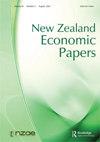{"title":"Housing equity and household consumption in retirement: evidence from the Singapore Life Panel©","authors":"Lipeng Chen, Liang Jiang, S. Phang, Jun Yu","doi":"10.1080/00779954.2020.1842794","DOIUrl":null,"url":null,"abstract":"ABSTRACT Housing affordability for elderly homeowners involves an entirely different set of issues as compared to housing affordability for first-time homeowners. To afford to ‘age-in-place’ may require homeowners to access channels that enable them to withdraw their housing equity to finance consumption in retirement. We utilize data from the Singapore Life Panel© survey to empirically investigate the impact of housing equity on the consumption of elderly households. Based on panel analysis, we find housing equity value has no significant impact on non-durable consumption for elderly people. The conclusion holds for a battery of robustness checks. Moreover, heterogeneity analyses based on subsamples by the health condition, the age of household head, the house type, and the number of properties owned also show no significant impact of housing equity on consumption. Finally, we use scenario analysis to study the Lease Buyback Scheme (LBS), a novel housing equity monetization scheme that allows elderly households to unlock housing equity for retirement financing. An individual scenario analysis reveals positive but negligible effects, which may explain the low take-up rate for the LBS.","PeriodicalId":38921,"journal":{"name":"New Zealand Economic Papers","volume":"55 1","pages":"124 - 140"},"PeriodicalIF":0.7000,"publicationDate":"2020-11-11","publicationTypes":"Journal Article","fieldsOfStudy":null,"isOpenAccess":false,"openAccessPdf":"https://sci-hub-pdf.com/10.1080/00779954.2020.1842794","citationCount":"3","resultStr":null,"platform":"Semanticscholar","paperid":null,"PeriodicalName":"New Zealand Economic Papers","FirstCategoryId":"1085","ListUrlMain":"https://doi.org/10.1080/00779954.2020.1842794","RegionNum":0,"RegionCategory":null,"ArticlePicture":[],"TitleCN":null,"AbstractTextCN":null,"PMCID":null,"EPubDate":"","PubModel":"","JCR":"Q3","JCRName":"ECONOMICS","Score":null,"Total":0}
引用次数: 3
住房公平与退休家庭消费:来自新加坡人寿保险委员会的证据©
摘要:与首次购房者的住房负担能力相比,老年房主的住房负担力涉及一系列完全不同的问题。为了负担得起“就地养老”可能需要房主获得渠道,使他们能够提取住房权益,为退休后的消费提供资金。我们利用新加坡生活小组©调查的数据,实证调查住房公平对老年家庭消费的影响。基于面板分析,我们发现住房净值对老年人非耐用消费没有显著影响。这一结论适用于一组稳健性检查。此外,基于健康状况、户主年龄、住房类型和拥有房产数量的子样本的异质性分析也表明,住房公平对消费没有显著影响。最后,我们使用情景分析来研究租赁回购计划(LBS),这是一种新的住房权益货币化计划,允许老年家庭解锁住房权益用于退休融资。个别情景分析揭示了积极但可忽略的影响,这可能解释了LBS的低接受率。
本文章由计算机程序翻译,如有差异,请以英文原文为准。


